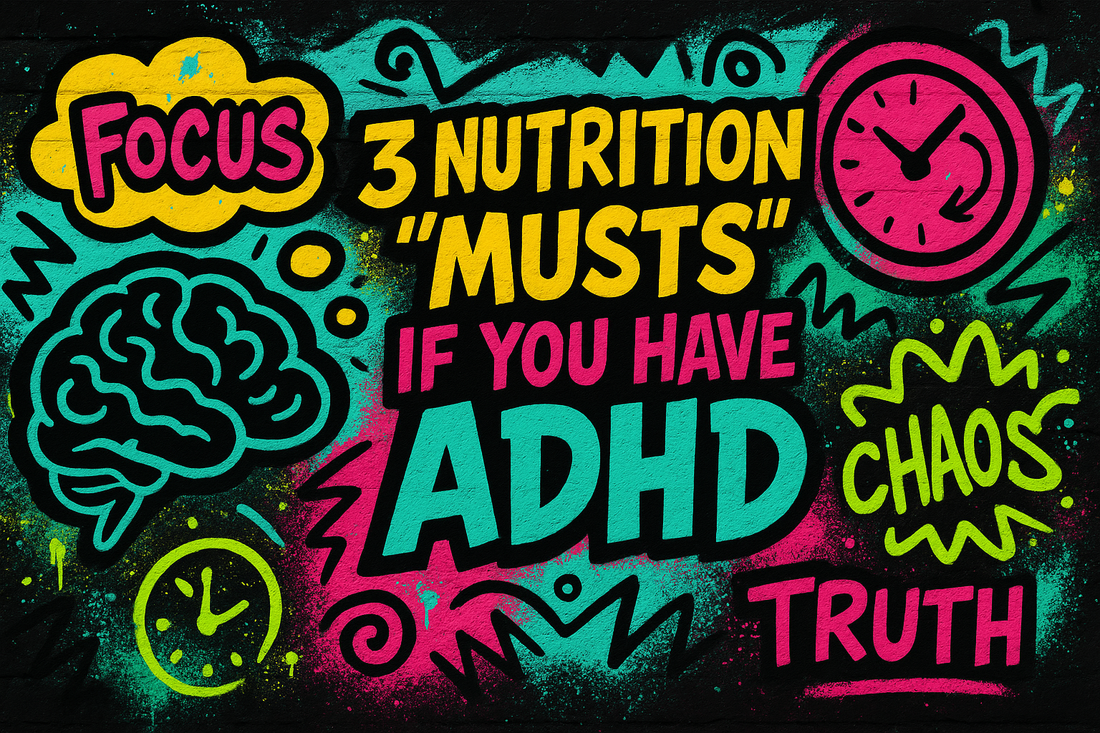
3 Nutrition ‘musts’ If You Have Adhd
Share
Living with dyslexia and ADHD can feel like a rollercoaster, especially when it comes to managing nutrition and overall health. In this episode of the Added Nutrition podcast, I share the ins and outs of my personal journey. We cover why it’s so important to customise a plan, rather than rely on one-size-fits-all strategies.
We chat about creating a flexible approach that includes tailored meal timing, supplements, and even a few myths about ADHD. If you’ve ever battled binge eating or felt that mainstream advice just doesn’t fit, this episode offers fresh ideas you can use right away.
My Journey with Dyslexia and ADHD
I’ve lived with dyslexia for years, and I was later diagnosed with ADHD. It wasn’t always easy managing my health. Like many, I tried every diet under the sun, but I eventually realised I needed something that responded to my unique brain wiring.
Along the way, I discovered how skipping meals set me up for late-night munchies, how certain supplements gave me the mental edge I always wanted, and how a handful of small tweaks could transform my daily routine. It felt like a relief to learn there’s no one right way to eat or train.
“When you have ADHD, one-size-fits-all approaches rarely work. Tailored solutions are key.”
That’s why I launched this podcast. I want everyone, from newly diagnosed adults to those who’ve known they’re neurodivergent for years, to have a simple place to explore better nutrition and health strategies.
Fine-Tuning Nutrition for Neurodivergent Brains
Food is more than just fuel. It’s also a way to keep our brain chemistry balanced, especially if you juggle ADHD. One of my finds was creatine, which showed promising cognitive benefits. It’s something that supports the brain and can be a useful addition for many people.
Another tip that transformed my relationship with food was eating earlier in the day. It eased my evening cravings, cut down on bingeing, and kept me focused. Trying to follow the same fasting trends as everyone else never worked for me. I learned to adapt meal timing to suit my energy dips and peaks.
Here’s how some of those small changes look:
- Have a solid breakfast with protein and healthy fats.
- Keep snacks on hand if you’re prone to regular energy crashes.
- Balance carbs with proteins to avoid sugar spikes.
Sleep and Supplementation
Sleep can be tricky when your brain won’t switch off. My ADHD often keeps me up late, so I tried various supplements. The ones that worked most consistently were magnesium glycinate and L-theanine. They calm the mind without leaving me groggy the next day.
These aren’t magic pills. But if you find yourself lying awake at 2 a.m. counting sheep, they might help. A calming bedtime routine also makes a huge difference. Sometimes it’s as simple as dimming the lights and turning off devices sooner than feels normal.
Binge Eating and Intermittent Fasting
Intermittent fasting is popular these days. But I discovered quickly it can backfire if you have ADHD. If you’re not careful, you might end up starving through the morning, then over-eating later.
To avoid the binge cycle, I had to be realistic about hydration, meal timing, and portion sizes. I still skip meals when life gets hectic. But I’ve learned to see the early signs of an energy crash, and I keep easy meals at the ready. Everyone’s different, so if fasting makes you feel terrible, it’s okay to pass on the trend.
Looking Ahead
My goal with the Added Nutrition podcast is to dispel myths, offer real solutions, and gather experts who understand the challenges of being neurodivergent. There’s so much misinformation out there that it can be confusing for adults with dyslexia or ADHD who just want to feel better.
In future episodes, you’ll hear more about how to fine-tune your meal planning, use specific supplementation protocols, and find an exercise routine that actually sticks. We’ll also feature professional guests who’ll help us dig deeper into these topics. I’d love to hear what you’re struggling with. Your questions shape what we cover on the show.
- We focus on ADHD, dyslexia, and nutrition insights.
- Eating earlier in the day helps prevent binge eating.
- Creatine may give your brain a boost if you have ADHD.
- Magnesium glycinate and L-theanine soothe the mind at bedtime.
- Intermittent fasting doesn’t work for everyone.
- We want to bust rumours and myths about ADHD management.
- Join us for expert guests and real-life success stories.
If this resonates with you, make sure to listen to the full episode of the podcast (the player is at the top of the page). You’ll find even more details on how I discovered these tips and what you can try next. Thanks for reading, and I hope to chat again soon!

